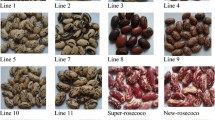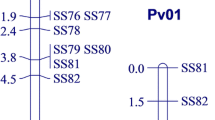Summary
The bean weevil Acanthoscelides obtectus, is an important storage pest of common beans in Latin America and Africa. A few wild bean accessions from Mexico have been identified as highly resistant to the weevil. One accession, G 12952, was crossed to two susceptible bean cultivars differing in seed size. Reciprocal F1 and F2 individual seed were evaluated for days to adult emergence (DAE) and emerged adult weight. Maternally inherited seed size affected resistance measurements only in the F1 reciprocal crosses, however, the overall resistance level of the F1 was more similar to that of the susceptible cultivars. The F2 showed a continuous, but skewed distribution from low to high DAE. Very few F2 individuals had the resistance level of G 12952. When the frequency distributions were divided into discrete categories based on parental response, resistance was found to be inherited as two recessive complementary genes. The F3 generation showed an overall lowering of resistance levels compared to their original F2 evaluations. However, none of the lines classified as resistant (≥50 DAE) in the F2, fell into the susceptible category in the F3, indicating that the resistant genotypes were relatively stable as expected with recessively inherited traits. Modifying genes from the commercial parents may be responsible for general lowering of resistance. Seed size was negatively correlated with adult weight but not with DAE. The unique resistance of the wild bean accessions is discussed in relation to its inheritance. The results and obstacles encountered in the A. obtectus breeding program at CIAT are described.
Similar content being viewed by others
References
Cardona, C. & J., Kornegay, 1989. Use of wild Phaseolus vulgaris to improve beans for resistance to bruchids. In: S., Beebe (Ed.), Current Topics in Breeding of Common Beans, pp. 90–98. Proc. of the International Bean Breeding Workshop, 7–12 November, 1988. CIAT, Centro Internacional de Agricultura Tropical, Cali, Colombia. Working Document No. 47.
Cardona, C., C.E., Posso, J., Kornegay, J., Valor & M., Serrano, 1989. Antibiosis effects of wild dry bean accessions on the Mexican bean weevil and the bean weevil (Coleoptera: Bruchidae). J. Econ. Entomol. 82: 310–315.
Cardona, C., J., Kornegay, C.E., Posso, F., Morales & H., Ramízer, 1990. Comparative value of four arcelin variants in the development of dry bean lines resistant to the Mexican bean weevil. Entomol. Exp. App. 56: 197–206
Gatehouse, A.M.R., P., Dobie, R.J., Hodges, J., Meik, A., Putszai & D., Boulter, 1987. Role of carbohydrates in insect resistance in Phaseolus vulgaris. J. Insect Physiol. 33: 843–850.
Howe, R.W. & J.E., Currie, 1964. Some laboratory observations on the rates of development, mortality and oviposition of several species of Bruchidae breeding in stored pulses. Bull. Entomol. Res. 55: 437–477.
Osborn, T.C., D.C., Alexander, S.S., Sun, C., Cardona & F.A., Bliss, 1988. Insecticidal activity and lectin homology of arcelin seed protein. Science 240: 207–210.
Schoonhoven, A.van & C., Cardona, 1980. Insects and other bean pests in Latin America. In: H.F., Schwartz & G.E., Galvez (Eds), Bean production problems: disease, insect, soil and climatic constraints of Phaseolus vulgaris, pp. 363–412. CIAT, Centro Internacional de Agricultura Tropical, Cali, Colombia.
Schoonhoven, A.van & C., Cardona, 1982. Low levels of resistance to the Mexican bean weevil in dry beans. J. Econ. Entomol. 75: 567–569.
Schoonhoven, A.van, C., Cardona & J., Valor, 1983. Resistance to the bean weevil and the Mexican bean weevil (Coleoptera: Bruchidae) in noncultivated common bean accessions. J. Econ. Entomol. 76: 1255–1259.
Author information
Authors and Affiliations
Rights and permissions
About this article
Cite this article
Kornegay, J.L., Cardona, C. Inheritance of resistance to Acanthoscelides obtectus in a wild common bean accession crossed to commercial bean cultivars. Euphytica 52, 103–111 (1991). https://doi.org/10.1007/BF00021322
Received:
Accepted:
Issue Date:
DOI: https://doi.org/10.1007/BF00021322




